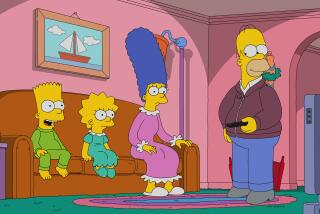Losing Our Way on the Road to Utopia
- Share via
Do you remember the future? How glorious it was! Technology solved all the problems of the human race and seemed to create no new ones of its own. People glided around in electric cars on electric roads or lived in self-sustaining undersea cities.
Much of it was ridiculous, and little of it came true. But looking back on it now proves fascinating and sobering in “Yesterday’s Tomorrows,” a film made by director Barry Levinson as part of Showtime’s ongoing “In the 20th Century” specials. “Tomorrows” premieres on the pay-cable channel Monday at 10 p.m. with additional showings throughout the month.
It’s really less a film than a talk show, but the talkers assembled are so eclectic and illustrious it would have been very hard to get them all to sit down in the same place at the same time. So they were interviewed separately and their comments spliced into a tapestry that also includes visions of the future put on film in the past eight decades or so.
Most of the films quoted are not theatrical sci-fi movies, but rather films underwritten by giant corporations to convince the American people that the future held a world of wonders and all they had to do was sit around and wait for it. Most of it never happened. Some people are still waiting.
TV-telephones have been promised us, for example, since the ‘30s, maybe even before. Such phones--that show you whom you’re talking to and vice versa--do exist, but are incredibly expensive and provide a crummy picture anyway. Actually, video e-mail now seems a more likely possibility, with TV cameras mounted on home computers, a revolution that virtually nobody predicted half a century ago.
An impressive array of guest experts and opinionators pass by. Comic Dick Gregory defends the future at least as compared to the past: “The only thing good about ‘the good old days’ was, they left.” Ralph Nader says futurists of yesterday foolishly envisioned a tomorrow “totally congenial to people’s needs” without imagining such grim realities as pollution and congestion.
Andy Rooney of “60 Minutes” complains that “if we learn to do something--even if it’s bad for us--we do it.” At that point, he’s talking about cloning. But he sounds like an ignoramus earlier when he foolishly grumps of the great moon landing of 1969, “It meant zero. . . . It has done nothing for any of us.” Sometimes it seems it would be a good idea to slap Andy Rooney’s face and tell him to shut up.
Other commentators range from humorist Fran Lebowitz, who believes--not without evidence to back her up--that all change is bad; authors Alvin and Heidi Toffler, who invented the apt term “future shock” and at one point amusingly argue over a date from the past; novelist E.L. Doctorow, who considers the 1939 New York World’s Fair more of a World’s Prayer, with the Great Depression having taken its toll and World War II on the horizon; and architect Philip Johnson, who notes that by 1964, “progress had rather frayed edges, didn’t it?”
1964 was the year of the New York World’s Fair, a bombastic spectacular that lavishly promised some of the same miracles foretold at the ’39 World’s Fair. And today, the whole idea of World’s Fairs, and of idealistic visions of the future, is pretty much kaput. Movies now made about the future usually depict it as a global war zone ruled by the same kinds of giant corporate entities that promised us utopia and nirvana decades ago.
The whole idea of a future made glorious by technological advances now seems a quaint thing of the past.
Levinson’s film becomes very repetitious and should probably have been shorter than its 95 (or so) minutes, but the guest experts have such provocative and irreverent ideas that it’s worth staying tuned to the end. “The whole belief in progress is now out the window,” Johnson says bluntly near the show’s conclusion. It was, in some ways, a wonderful future. Too bad it had to end.
More to Read
The complete guide to home viewing
Get Screen Gab for everything about the TV shows and streaming movies everyone’s talking about.
You may occasionally receive promotional content from the Los Angeles Times.






